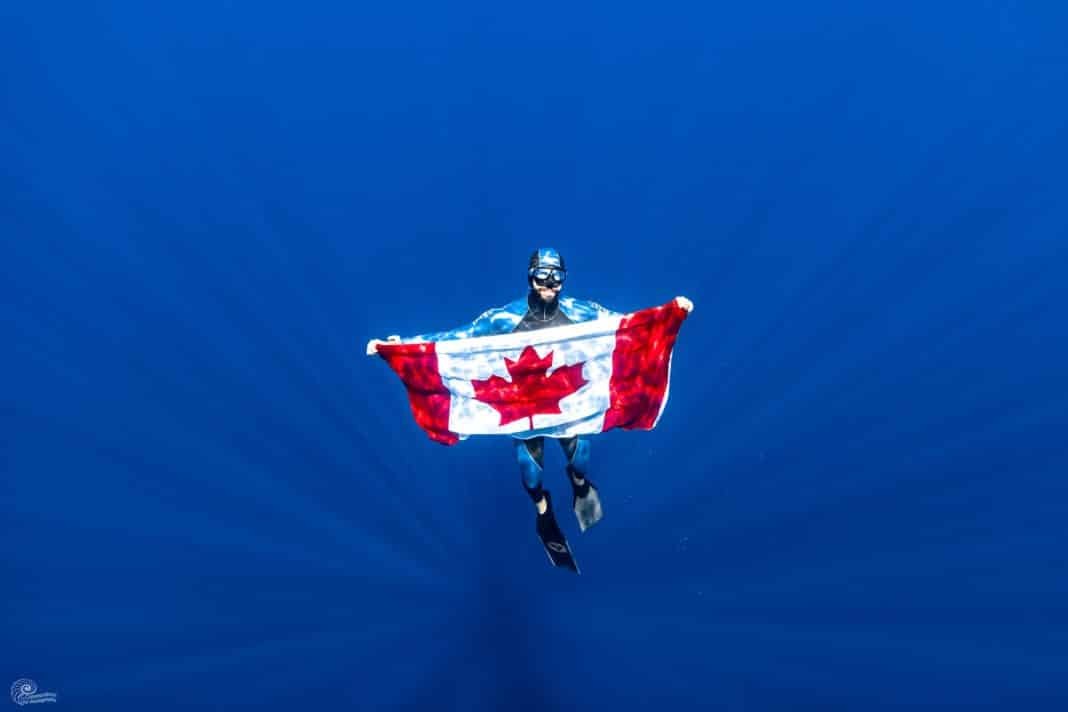The Great White North is not a place one normally associates with freediving. Yet, Canada has a reputable history in the sport with vanguards such as Mandy-Rae Krack, William Winram and Eric Fattah that produced early world records and contributed to technical development.
As we look to a new decade and the next freediving season on the international circuit, we reflect on what was a hugely successful 2019 for Canadian freediving. As old records were broken and new ones set, there seems to be a veritable rise of new champions, seemingly a long time in the making as a new wave of Canadian athletes makes their mark on the competitive stage.
New national records were set in both depth and pool in 2019. While it might be easy to attribute these to the new AIDA Constant Weight Bifins discipline, in fact, long-standing records in CWT and FIM were broken. New continental records were also established, making last year a pivotal one for Canada in the sport.
Two athletes, in particular, made huge contributions by competing internationally across all four depth disciplines. To find out what it took to get there, I sat down with Sheena McNally of Alberta and Matthieu Duvault of Quebec to talk about their achievements and what it took to get there.
Although the two are now good friends who meet up and train regularly at competitive events, neither knew the other when they started freediving. Both set off in 2015, embarking on individual yet remarkably parallel journeys that share a common thread of sacrifice, perseverance, and dedication to the sport. What they have achieved dispels any notion that full time, competitive freedivers live a carefree life in warm climes while traveling the world chasing the depths in the big blue. It is true, they have each in their own way, carved out the lifestyles they sought out, but their success hasn’t come without hardships along the way.
Financial Woes
Matt’s journey began with the decision to quit his job in Montreal and move to Thailand to take up scuba diving, with the goal of becoming an instructor, seeking that carefree life away from the hustle and bustle before he discovered freediving as his true passion. Sheena also started off scuba diving, initially thinking that freediving wasn’t something she would even be capable of. Yet, after trying freediving, getting over the initial nervousness she fell in love with the sport. Following some travels, Sheena was set to return to work in Canada but stayed on in Honduras to freedive some more, and the rest is history.
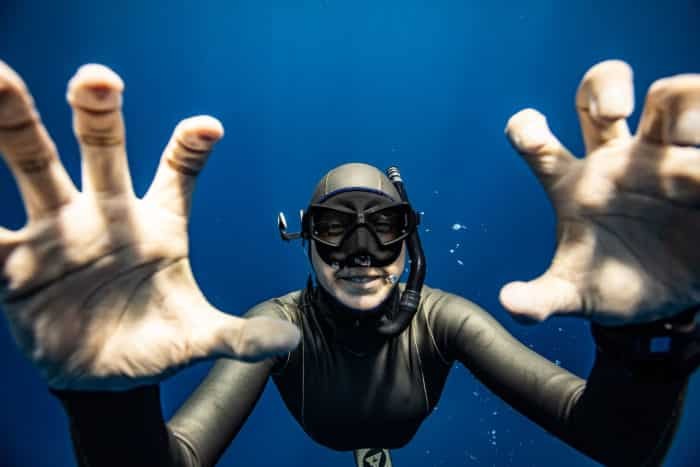
It is no secret to most freedivers that there are no riches in the sport. Those who decide to train, teach and compete full time must balance a means of income with the challenges of finding time to train. Matt is quick to point out that “Nothing is certain, it’s often seasonal in outlook. All your money goes into freediving. It is a choice. It’s the reality of being a professional freediver.” Sheena agrees, saying that “No matter where you work if you’re teaching freediving you’re going to be poor. People don’t get into it for the money, but because it lets you do what you love, in some small or big way.”
Matt and Sheena, like most competitive free divers, are also instructors. While they are passionate instructors, teaching involves long but rewarding hours of introducing beginners to the sport in the pool and ocean. A vital means of income, teaching needs to be balanced with the time required for training, often the two juxtapose one another – teaching time is time away from training. “To focus on depth training you have to let the teaching pause. You cannot realistically do both because you pause your job and your income. You have been working a job that doesn’t make money then you end up bleeding money to train.” Sheena explains “After a few years, you learn. You are resourceful. You somehow make it.”
Following the freediving dream meant giving up a steady paycheck, learning to become self-reliant and adaptable. Sheena and Matt train and compete when they can, but the remaining time is dedicated to generating income for the next training spell. They are often broke, and at times in debt.
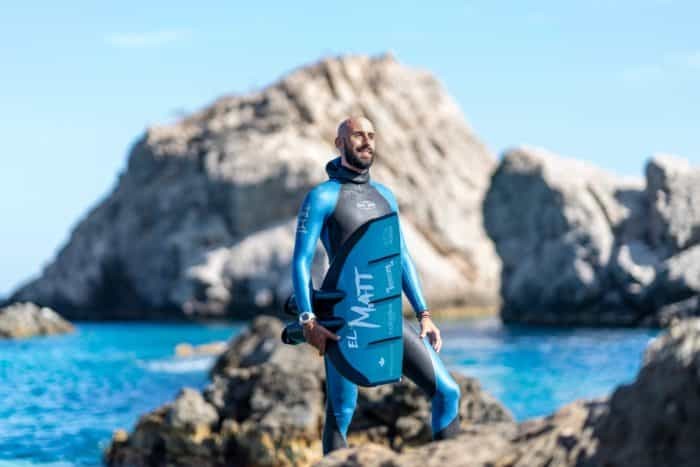
Matt, who was always a passionate photographer, was forced to sell his camera in order to fund his freediving instructor course, having to sacrifice one passion to follow another. Coming full circle, it wasn’t until late last year that Matt was able to purchase a new camera with the intent to merge his two passions into one.
When they decided to follow their dreams, they did so with no guarantees as to where it would lead, no sense they would ever dive as deep as they have. They listened to their hearts and took a leap of faith. Hard work and dedication brought them to where they are now. While it is possible to train for freediving in the cold waters of Canada, in order to access depth regularly, Matt and Sheena have had to relocate to warmer climes, seek out parts of the world with the right conditions. Living somewhere warm is part of the freediving lifestyle for sure, but it means being away from home, family, and friends.
In 2019, Sheena needed a cash injection to continue training and returned to Canada for a couple of months, planting trees in the forestry sector for money. Preceded by its reputation for being a grueling experience, many young Canadians look to earn summer cash by spending long backbreaking days planting young trees in the rugged, rocky wilderness. Sheena’s foray into tree planting wasn’t quite financial success she had hoped for but there were other lessons, as she recalls “That hardness of it, it translates, not specifically to freediving but to a lot of other areas in life. If you can lie down in impossible [to plant] land and cry and then eventually pick your shovel up and keep going, everything else seems easy by comparison.”
Passion For The Deep
Given the risks these two have taken, most people would never even contemplate such a challenge at the sacrifice of financial and career security. There is, however, a separation in what values are important between a traditional lifestyle and being a full-time freediver.
That separation is also a real-life metaphor for the experience of being underwater as Sheena describes her experience “Life was just very complicated and messy at the surface and there was something with freediving that when you’re on a dive when you are under the water and you’re doing a deep dive on the line, it is really just you. You are completely separate from what is happening at the surface. And whether you succeed or fail or whatever happens under the water it is all on you and has nothing to do with anyone else.”
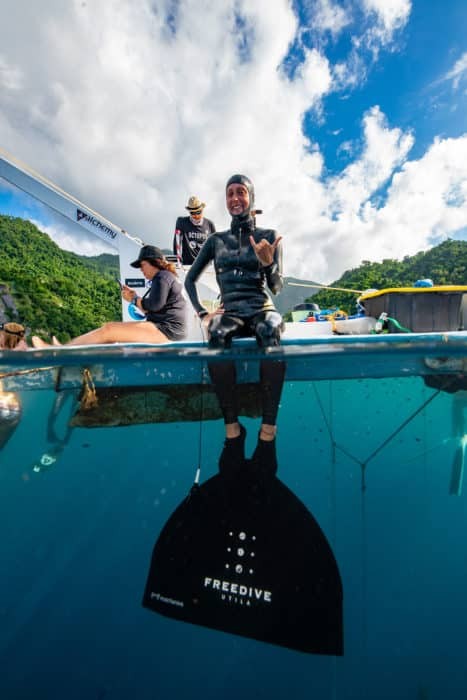
“For me I think it just ticks all the boxes,” Matt says “because it makes you travel, it makes you discover yourself, it makes you always get better even if it frustrating and it’s long. But when you achieve something, you’re very happy with yourself and you’re proud.” Ultimately for him it is also about being underwater “When you’re underwater with the silence, it’s completely different.”
These deeply passionate reasons keep them to the sport, for which the trials they face are wholly worth it. They are both keen to point out that freediving is above all a lot of fun and Matt concedes there is a perk to venturing deep “Now that I start to get deeper as well, I can say honestly the narcosis is really nice. It’s a nice part of deep diving.”
Training
Once freedivers do manage to find the money and time to dedicate themselves to training, the hard work is really only just beginning. There is absolutely no guarantee of success as both Sheena and Matt will readily admit. However, without risk, there is certainly no reward. Just as their sacrifices took time and determination, their individual progress to depth didn’t come with instant success and certainly not overnight. Setbacks and plateaus are common in sports training, progress is often uneven.
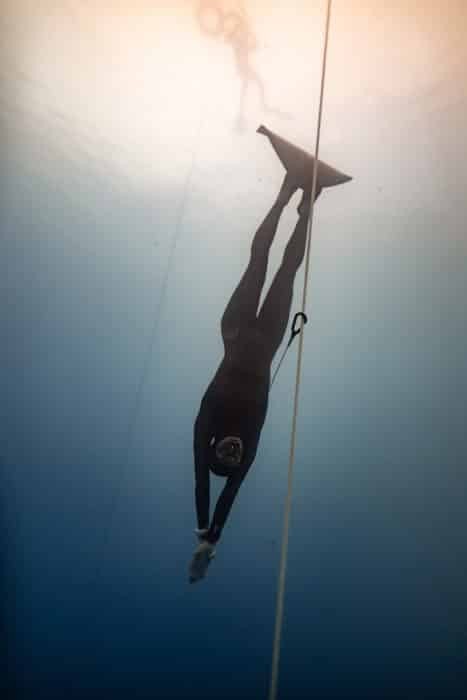
Sheena points out that it is important to ”Not to get too attached to results” in training, whether they are positive or negative and accept that the lows and highs are a normal part of the training, “Otherwise you’re always going to crave that success and you’re always going to be upset when you have failures and that’s going to hinder your progress”. Because training can be challenging, it is important to find balance. One of Matt’s biggest lessons of the year was to keep things fun and make concessions, he says “Try not to get too serious and not too stressed about everything because it won’t change much about your diving. It is ok for me to drink a beer after diving, for example.”
Offering advice for new freedivers Sheena explains that it’s important to surround oneself with and learn from divers that are better than you “You want to be diving with people better than you, you don’t want to be the big fish in a small pond because you won’t learn anything useful.” Matt agrees adding “Don’t go too fast. Try to have good advice and someone following your progress, to set you in the right direction”.
The Rewards
Just as training doesn’t follow a linear progression of successive personal bests, neither do the results in a competition where failures are often very public. No risk, no reward. Despite setbacks, 2019 brought tangible rewards for the Canadian athletes.
Matthieu Duvault
Matt’s competitive season started with the Xibalba Freediving Competition in Mexico’s Yucatan Peninsula where he set his first-ever AIDA National Records (NR) for Canada with Constant Weight Bi-fin (CWTB) dives to 78m / 256ft and 82m / 269ft in April.
Although he was excited about being selected for Team Canada at the AIDA World Championships in Nice, France, Matt was unable to attend as he was unable to travel. Yet, in September, although he turned early during an 83m / 272ft CWTB NR attempt during the Authentic Big Blue event in Greece, he managed the dive the following month at the Infinity Depth games in Cyprus.
In November, between competitions, he squeezed in travel to Bali to further his freediving education, becoming the first Canadian Molchanovs Instructor Trainer. The toll of training and travel would become evident as equalization issues manifested themselves as he made final preparations for the Blue Element Competition in Dominica.
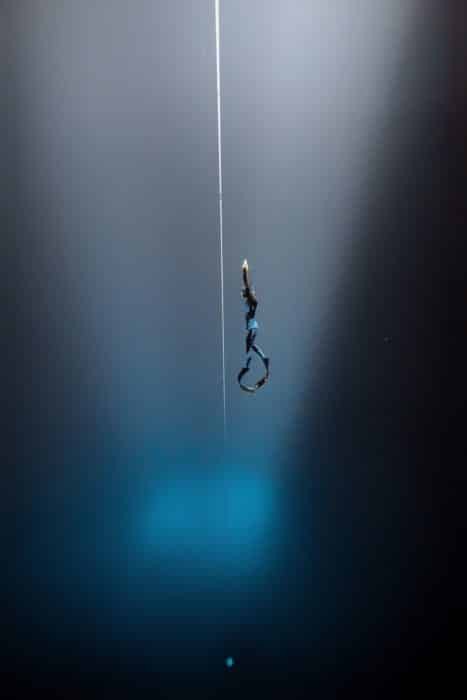
Against these challenges, he persevered to attempt another CWTB NR dive for Canada to 85m / 279ft in Dominica, even though he made the plate he was disqualified for a technical pull on the rope at the end of the dive. Yet, the year ended on a high note for Matt, successfully completing a 60m / 197ft Constant Weight No-Fins (CNF) dive at Blue Element and a post-competition personal best to 90m / 295ft in Constant Weight (CWT), a dive he surely intends to repeat this year in front of judges.
Sheena McNally
After setting her first AIDA National Record during her first-ever competition dive with a 75m / 246ft Free Immersion (FIM) dive in 2018, Sheena returned to the competition scene in 2019. Her first competitive success came in early August during the Caribbean Cup in Roatan, Honduras with an 82m / 269ft Free Immersion (FIM) NR dive. The following day she set another national record to 78m /256ft in Constant Weight Bifins (CWTB) eclipsing the first Canadian CWTB national record set in May by Nathalie Remilliard at 23m / 75ft in Dahab. However, the next two days in Roatan were beset by her first two red cards as she attempted back-to-back national record FIM dives to 85m / 279ft, an experience that would leave a lingering fear of having bad outcomes. The Infinity Depth Games in the cool waters in Cyprus brought more setbacks when her 89m / 292ft Constant Weight (CWT) national and continental record attempt resulted in a yellow card due to an early turn at 79m / 259ft.
Redemption, for Sheena, would come in November in the remarkably clear blue waters in Soufriere Bay at Blue Element in Dominica, in the form of four national records and three continental records. She started by pushing the FIM national record to 83m / 272ft. The following day, on November 21st, she broke a 12-year standing CWT national record previously held by Mandy-Rae Krack, taking it to 89m / 292ft. Not satisfied with this, two days later, the CWT national record for Canada stood at 91m / 299ft and with that Sheena now held the continental record for CWT twice.
Yet, it was her last dive of the season in her favorite discipline, Free Immersion, that was her most important at Blue Element, overcoming the negative feelings that haunted her since Roatan. She finished with another national and continental record-setting dive to 85m.
Other Canadian Records
These outstanding achievements in depth by Sheena and Matt were further cemented by new national records in pool disciplines in 2019, notably with Sylvain DeSaulnier breaking a massive 15-year static apnea record previously held by Eric Fatah, setting a new time of 7min 14secs. William Winram and Lilly Ryzebol also set records for the new AIDA Dynamic Apnea Bifins (DYNB) discipline for men’s (160m / 525ft) and women’s (117m / 284ft), respectively.
The Future Of Canadian Freediving
When asked what their proudest achievements in freediving are, it isn’t the progress they have made to amazing depths or the mark they have made on Canadian freediving. You can be sure they are humbly proud of these, but the answer is more personal. Their proudest moment, reflecting once more their individual but parallel journeys, was having the courage to leave their 9-to-5 working lives, to take that leap of faith and follow something they fell in love with.
Observing them in competition, it is evident that they carry this proud moment close to their hearts and embrace the Canadian spirit as they represent their country hoping their contributions to freediving will provide inspiration for other Canadians to follow. “I am very proud to represent Canada; I am very happy to raise the bar of this amazing country. There are so many people in Canada that are so good at it [freediving] and they don’t know it yet. I think it can be one of the strongest countries in the sport.” says Matt. Reflecting on her own achievements “What I think is really cool, is that Canada already had the North American record for CWT but now we have it for CWT and FIM. I think it’s cool that it’s Canada.” Sheena is distinctly proud of Canadian freediving.
It seems that metaphorically, time and pressure, both physical properties that apply to freediving, have made their mark on Canadian freediving as Matt and Sheena’s dedication and perseverance have demonstrated. Together they have set the bottom plate significantly deeper for Canadian freediving in a single year, probably more than any year in recent times.
As they head into the 2020 competitive season, they are both once again trying to juggle challenges of teaching, finances and new projects with training. Given their tenacity, we are bound to see more remarkable achievements from Sheena and Matt in the coming years. It is truly an exciting time for Canadian freediving!
You can follow Sheena’s journey on Instagram via @sheenaneedscoffee or at sheenamcnally.com while the prolific Instagrammer Matthieu Duvault can be found at @cenotefreediving and @mattfreediver or at cenotefreediving.com

